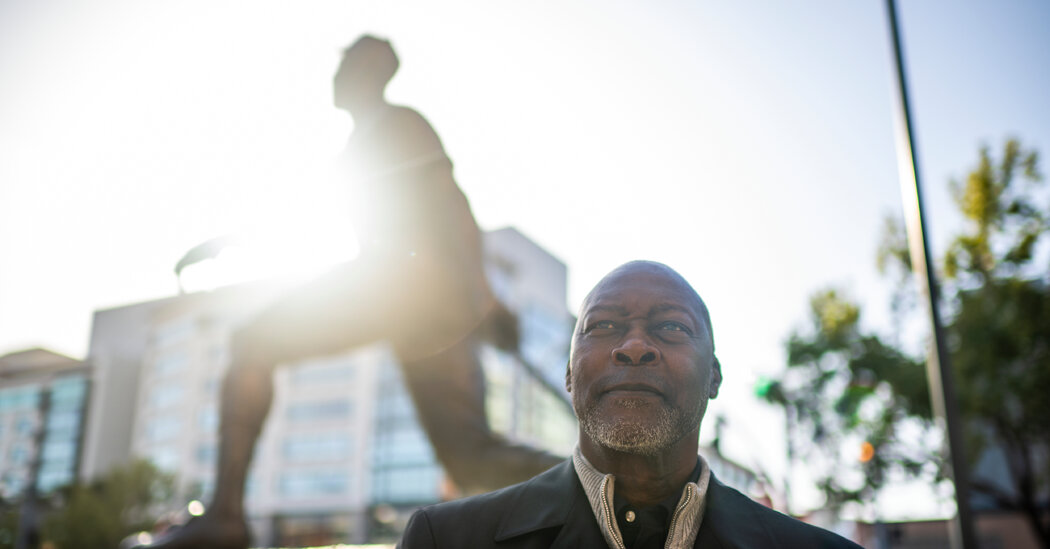
In the fall of 2016, when Dave Stewart was fired by the Arizona Diamondbacks after serving as the team’s general manager for two seasons, he was uncharacteristically short of words.
“To be honest with you, I’m kind of relieved,” he said at the time. “Quite frankly, I’ve got better things to do.”
Fifteen years before, when the Toronto Blue Jays hired J.P. Ricciardi as their general manager, passing over Stewart who had been the team’s assistant general manager for three seasons, Stewart had been far more outspoken.
“They think the only people capable of doing these jobs are white people, not minorities,” he said.
Whether discussing M.L.B. front offices or pitching rotations, Stewart has been regularly vocal about the league’s enduring whiteness.
But in 2016, when Arizona pushed him out, there was no scathing rebuke for the Diamondbacks, nor any mention that, with his ouster, M.L.B. would have zero Black general managers. Last month, in a small conference room in Nashville, Stewart finally clarified his muted response.
“The day that I left there, my first thought of ownership came,” he said. “Actually, while I was doing it, the whole time I was thinking, wait till I get my own team.”
In the coming years, he may have his chance.
Stewart was speaking in the headquarters of Music City Baseball, an investment group that he is working with to bring a Major League Baseball team to Nashville. The group hopes to call their team the Nashville Stars, in tribute to a semipro Negro leagues team. It would be M.L.B.’s first majority Black-owned club, and it would be led by Stewart.
Dubbed “Smoke” for the power of his right arm, Stewart notched World Series titles with the Los Angeles Dodgers, the Oakland Athletics, and the Blue Jays, with a dominant stretch for Oakland in which he had four consecutive 20-win seasons. By his own accounts, he was routinely disrespected and discarded along the way — and that was before he ever made it to a coaching staff or front office.
His experiences working as a pitching coach, an executive and an agent proved heartbreaking at times, but they also led to this potentially game-changing moment for baseball.
The 2022 M.L.B. Season
“Relax, all right? Don’t try to strike everybody out. Strikeouts are boring! Besides that, they’re fascist. Throw some ground balls, it’s more democratic.”
- Look Good, Feel Good, Play Good. Smell Good?: For numerous players, a heavy dose of cologne or women’s perfume is the unlikeliest of performance enhancers.
- The Third Baseman’s Gambit: Manny Machado is the hottest hitter in baseball, and he is coming for your Queen.
- The Loneliest Team in Baseball: The Oakland Athletics gutted their roster and flirted with Las Vegas. Now their fans appear to be in full revolt.
- King of Throws: Tom House has spent his life helping superstars get even better. With a new app he wants to fix young pitchers before they develop bad habits.
“There’s no anger,” he said. “When I walk out the door I’m disappointed most days. But then I get on my feet, and I’m good. So my attitude has changed from disappointment to: ‘What can I do today to be the best person I can be? And what can I do to be better than I was yesterday? And how can I help somebody?’”
Eventually he realized the way to help the most people would be to change who is making the decisions in baseball, a sport where things often come down to who a person knows.
He offered himself as an example, saying he wouldn’t have gotten the job in Arizona if not for his decades-long friendship with Tony La Russa, his former manager who was the chief baseball officer of the Diamondbacks at the time.
“I know his family; he knows my family,” Stewart said of La Russa.
In 2020, Theo Epstein, the departing top executive of the Chicago Cubs, acknowledged the flaws with that system, saying “the majority of people I’ve hired have similar backgrounds as me and look a lot like me.”
While Stewart can’t personally bridge the relationship gaps between M.L.B. executives and nonwhite job candidates, serving as principal owner of a team would allow him to give those candidates a fair shot with his club — whether on the field, in the front office or in the ownership group.
But there is no guarantee that M.L.B. will expand beyond 30 teams in the future, and even as the Tampa Bay Rays and the Athletics are currently pushing for new stadiums, there are options besides Nashville for them to settle should they choose to move.
As those situations play out, Music City Baseball works toward its goal of landing a team. John Loar, the group’s managing director who had previously worked with Stewart in an effort to purchase the Miami Marlins, said the group is staying true to Stewart’s long-held beliefs.
“Even in Miami, Dave’s core philosophy was Black leadership and the opportunity for Black managers and executives, but also potential equity in the team,” Loar said.
Indeed, a desire to help people, particularly Black people, has been a consistent through line of Stewart’s career. It comes with a zeal that surprises those who remember the unflinching stare that was his signature as a player — an approach that was the result of advice from the Hall of Famer Bob Gibson, Stewart’s fellow Black Ace. Gibson told him to never show emotion on the field, that visible frustration and elation could both be viewed as weakness.
During his playing days, Stewart followed Gibson’s advice. But changing times have brought increased responsibilities — and a different approach.
“Sometimes the few have to speak for the many, to make it better for the many,” Stewart said. “I’d much rather be the guy that got shot dead if it makes it good for everybody else.”
Music City Baseball’s proposed site for a new stadium is on land controlled by Tennessee State University. That historically Black college is in north Nashville, an area that has been both a source of pride and frustration for residents who believe they have been overlooked as Nashville achieved its “It City” status. For Stewart, the proposed development is an opportunity to revitalize a community that reminds him a lot of the East Oakland neighborhood he was raised in.
Stewart remembers Sunday afternoons when he and his childhood friend Warnell Simpson would convene on his front porch and discuss what they would do if they ever had a great deal of money. “It’s crazy,” Stewart said. “Even as kids, the things we talked about were putting our money into the community.”
East Oakland was an enclave of pro-Blackness that just happened to be the home of the Oakland A’s. During the baseball season, he and his cousins would sneak into Oakland Coliseum. They hid out in the right field seats, gobsmacked as A’s greats like Reggie Jackson and Bert Campaneris took batting practice.
When he wasn’t at the Coliseum, Stewart was immersed in the culture of the times. As much as he was shaped by baseball, Stewart was molded by the Rev. Dr. Martin Luther King Jr., by Malcolm X, and by the Black Panther party, which was headquartered in his hometown. “When you grow up in a Black community, those were the things that gave us hope,” he said. “I wasn’t raised in an environment where we talked about what’s against us or what we can’t do. What was against us, in Oakland, you knew it, because it was around you. You could see it.”
In hopes of being a similar source of pride for East Oakland — which he has seen decline over the years — Stewart attempted to purchase the city’s 50 percent stake in the Coliseum site. He planned to create a mixed-use development that would provide economic mobility for the surrounding community as well as affordable housing and even a museum focused on local Black history. And none of it would have hinged on the presence of the A’s. “I wanted to create a situation where East Oakland was a city inside of a city, where the East Oakland residents didn’t have to go to downtown or to San Francisco,” he said.
Stewart’s proposal was denied by the Oakland City Council, which awarded the site to the African American Sports and Entertainment Group. Stewart contends that group focuses too heavily on sports and made what he believes are unrealistic promises about bringing the N.F.L. back to Oakland, along with a W.N.B.A. team. Stewart said his group, which included his longtime romantic partner, the sports agent Lonnie Murray, looked into those options, neither of which had any likelihood of coming to fruition.
“Sports should not serve as the foundation of any community, especially not our community,” Murray said. “At the time that you had the Warriors and the Raiders both in Oakland, they did not provide full-time living wage jobs for the community. That was supplemental, seasonal income, in concessions or parking. How are you going to uplift and revitalize a community that is struggling financially and academically with more supplemental jobs that aren’t at living wages?”
While still caring deeply for the people of East Oakland, Stewart has moved on. “What I have been doing in the Oakland community is now what I have an opportunity to do in Nashville,” he said.
On May 16, Stewart, Loar, and Alberto Gonzales, the former U.S. Attorney General and currently the chair of Music City Baseball’s board of directors, had a meeting with Commissioner Rob Manfred that Stewart said went well. He said Manfred applauded the group’s commitment to diversity as well as the work they’ve already done to build the Nashville Stars brand (50 percent of merchandise sales benefit the Negro Leagues Baseball Museum).
The response was promising, even if it stopped short of a promise that a team could eventually call Nashville home. Stewart insists that the north Nashville development will happen regardless and that his promise to his people remains unwavering. He also knows that he’s got a lot of work to do to get to know the people of that community and to convince them that he is looking out for their best interests.
“People have said, ‘Well, good luck, I hope it happens,’” Stewart said. “My response is, ‘I’m going to make it happen.’ It’s not if it happens; it’s a matter of when it happens. I’m 65 years old. This is my last great mission. This is the one last thing that I get an opportunity to leave and have people say, ‘This guy really cared about us as a community.’”
